
Dry Fruits: A Delicious Path to Healthier Eating
ntroduction
In recent years, the global shift towards healthier eating has led to a resurgence in the popularity of dry fruits. These nutrient-rich snacks have gained attention for their ability to offer a quick, satisfying bite packed with essential vitamins, minerals, and antioxidants. Unlike many sugary and processed snacks, dry fruits provide a naturally sweet flavor without the guilt, making them an ideal choice for anyone looking to improve their diet. Why opt for dry fruits? From boosting energy levels to supporting heart health, dry fruits are small powerhouses of nutrition that suit nearly every lifestyle.
What Are Dry Fruits?
Dry fruits are essentially fruits that have been dehydrated to remove most of their water content. This drying process can happen naturally under the sun or through artificial methods such as dehydration machines. By removing the water, the fruit’s flavors become more concentrated, and the nutritional value is preserved or even enhanced. The absence of water also makes them shelf-stable, extending their life far beyond fresh fruit. Whether it’s sweet raisins or crunchy almonds, dry fruits come in a wide variety, catering to all taste buds.
Types of Dry Fruits
Dry fruits come in several categories, with each offering distinct benefits. Here are some of the most popular and nutritious types:
- Raisins: Dried grapes, known for their sweet taste, are rich in fiber, potassium, and antioxidants.
- Dates: A staple in Middle Eastern cuisine, dates are a natural sweetener loaded with iron, fiber, and magnesium.
- Almonds: A favorite in many households, almonds are packed with vitamin E, protein, and healthy fats.
- Cashews: Known for their creamy texture, cashews contain magnesium, copper, and good fats that support heart health.
- Figs: A chewy, sweet fruit that offers a good source of calcium, potassium, and fiber.
- Apricots: Rich in vitamin A and iron, apricots are great for eye health and boosting immunity.
Lesser-known dry fruits like goji berries, mulberries, and prunes are also making their way into kitchens due to their unique flavors and impressive health benefits.
Health Benefits of Dry Fruits
Dry fruits are often referred to as “nature’s candy” due to their sweet taste, but they are so much more than a sugary treat. Here are some of the core health benefits they offer:
- Nutrient-Rich: Dry fruits are concentrated sources of vitamins like A, C, and E, as well as minerals like magnesium, potassium, and calcium.
- Heart Health: Many nuts, like walnuts and almonds, contain heart-friendly fats that help lower bad cholesterol and improve cardiovascular health.
- Bone Strength: Dried fruits such as figs and apricots are rich in calcium and magnesium, which are crucial for maintaining strong bones.
- Digestive Aid: High in dietary fiber, dry fruits like prunes and figs promote gut health and help alleviate constipation.
- Skin Benefits: Antioxidants found in dry fruits, such as vitamin E in almonds, help in reducing skin damage and promoting a youthful glow.
Nutritional Value of Popular Dry Fruits
To make an informed choice about which dry fruits to include in your diet, here’s a breakdown of the nutritional content of some favorites:
| Dry Fruit | Calories (per 100g) | Protein | Fiber | Fat | Key Nutrients |
| Almonds | 576 | 21g | 12.5g | 49g | Vitamin E, Magnesium |
| Cashews | 553 | 18g | 3.3g | 44g | Copper, Magnesium |
| Raisins | 299 | 3g | 3.7g | 0.5g | Potassium, Iron |
| Figs | 249 | 3.3g | 9.8g | 0.9g | Calcium, Potassium |
| Dates | 282 | 2.5g | 8g | 0.4g | Iron, Vitamin B6 |
| Apricots | 241 | 3.4g | 7.3g | 0.5g | Vitamin A, Iron |
Weight Loss and Dry Fruits
When it comes to weight loss, dry fruits play a crucial role by offering satiety and curbing unhealthy cravings. They are high in fiber, which helps to keep you feeling full for a longer period. Unlike sugary snacks, dry fruits like almonds and walnuts provide healthy fats that support metabolism without spiking blood sugar levels. Dried berries and apricots can be a refreshing addition to salads or yogurt, providing a burst of sweetness with minimal calories.
Dry Fruits for Heart Health
Consuming dry fruits regularly can have a profound effect on heart health. Studies have shown that nuts, particularly walnuts and almonds, help reduce LDL cholesterol levels. These nuts are a good source of monounsaturated fats, which are beneficial for the heart. Additionally, the presence of magnesium, potassium, and antioxidants further supports cardiovascular health by reducing inflammation and blood pressure.
Boosting Immunity with Dry Fruits
A strong immune system is your body’s first line of defense against diseases. Dry fruits like walnuts, apricots, and dates are rich in antioxidants, which help to combat free radicals in the body. Vitamin E, found in almonds and hazelnuts, plays a significant role in improving immunity. Incorporating a variety of dry fruits into your diet ensures a diverse range of nutrients that strengthen the body’s defenses against illness.
Skin Benefits of Dry Fruits
Want radiant and youthful skin? Dry fruits can help. Nuts like almonds are loaded with vitamin E, an antioxidant known to protect skin cells from damage and maintain elasticity. Walnuts are another excellent choice, as they contain omega-3 fatty acids that moisturize the skin from within. Eating a handful of mixed dry fruits regularly can lead to smoother and healthier-looking skin.
Dry Fruits for Digestion
Digestive health is often overlooked, yet it plays a significant role in overall well-being. Dry fruits are high in dietary fiber, making them excellent for promoting good digestion. For instance, prunes are a natural remedy for constipation, while figs contain prebiotics that feed the beneficial bacteria in your gut. Regular consumption of fiber-rich dry fruits can aid in maintaining a healthy digestive system. If you want more information please visit Dry Fruits Store.


